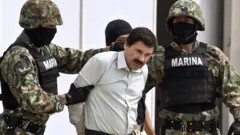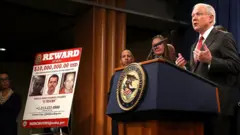The most powerful cartel in Mexico is a topic of great interest, especially for LGBTQ+ travelers planning a trip. At gaymexico.net, we understand your concerns and aim to provide you with information that helps you navigate Mexico safely and confidently. Explore gaymexico.net for up-to-date resources, LGBTQ+ travel advice, and insights into enjoying Mexico’s vibrant culture.
1. Understanding the Landscape of Mexican Cartels
Mexican cartels are criminal organizations that traffic drugs, engage in other illicit activities, and wield significant power. These cartels significantly impact security and governance in various regions, which is crucial for anyone traveling in Mexico to understand. For LGBTQ+ visitors, knowing which areas are safer and how to stay informed is essential for a worry-free experience.
1.1. What Defines a Powerful Cartel?
A powerful cartel is defined by several factors:
- Territorial Control: The extent of land and cities under its influence.
- Financial Resources: Ability to generate revenue through drug trafficking and other criminal activities.
- Firepower: Access to weapons and willingness to use violence.
- Political Influence: Capacity to corrupt or intimidate government officials.
Understanding these elements helps paint a picture of the current power dynamics in Mexico.
1.2. Historical Context of Cartels in Mexico
The history of cartels in Mexico dates back to the early 20th century. Initially, these groups were primarily involved in smuggling alcohol during the Prohibition era in the United States. Over time, they evolved into sophisticated drug-trafficking organizations, capitalizing on the demand for illicit substances in the U.S. and other countries.
1.3. Key Players and Their Territories
Several cartels operate in Mexico, each with its own territory and area of influence. The most prominent include:
- Sinaloa Cartel: Historically one of the most dominant, operating primarily in northwestern Mexico.
- Jalisco New Generation Cartel (CJNG): A rapidly growing cartel known for its aggressive tactics and expanding reach.
- Gulf Cartel: One of the oldest cartels, operating in northeastern Mexico.
- Los Zetas Cartel: Known for its brutality and presence in northeastern Mexico.
Mapping these territories is vital for travelers to avoid high-risk areas.
2. The Reign of the Sinaloa Cartel
 Joaquin "El Chapo" Guzmán, former leader of the Sinaloa Cartel, whose imprisonment has led to shifts in cartel power dynamics in Mexico
Joaquin "El Chapo" Guzmán, former leader of the Sinaloa Cartel, whose imprisonment has led to shifts in cartel power dynamics in Mexico
For many years, the Sinaloa Cartel held the top spot as the most powerful cartel in Mexico. Founded in the late 1980s, it was famously led by Joaquín “El Chapo” Guzmán. The cartel’s influence and vast drug-trafficking operations have been well-documented.
2.1. “El Chapo” and the Sinaloa Empire
Under “El Chapo,” the Sinaloa Cartel became the primary supplier of illegal drugs to the United States. His leadership was characterized by violence and strategic alliances, which helped the cartel outmaneuver rival groups. Guzmán’s capture and subsequent life sentence in the U.S. marked a turning point, leading to increased regional violence as other groups sought to exploit the power vacuum.
2.2. Current Status and Leadership
Despite “El Chapo’s” imprisonment, the Sinaloa Cartel remains a formidable force. It continues to dominate northwestern Mexico and has a presence in cities worldwide. The cartel is reportedly now partially controlled by Guzmán’s son, Ovidio Guzmán Lopez.
2.3. Impact on Drug Trafficking and Violence
The Sinaloa Cartel’s continued operations contribute significantly to drug trafficking and violence in Mexico. Their control over key trafficking routes and distribution networks ensures a steady flow of illicit narcotics to the U.S., Europe, and Asia. This has far-reaching implications for public safety and security in the region.
3. The Rise of the Jalisco New Generation Cartel (CJNG)
 Former US Attorney General Jeff Sessions announcing a reward for the capture of the Jalisco New Generation Cartel (CJNG) leader, highlighting the cartel's significance in international law enforcement efforts
Former US Attorney General Jeff Sessions announcing a reward for the capture of the Jalisco New Generation Cartel (CJNG) leader, highlighting the cartel's significance in international law enforcement efforts
Formed around 2010, the Jalisco New Generation Cartel (CJNG) has emerged as the Sinaloa Cartel’s strongest and most aggressive competitor. The CJNG has rapidly expanded across Mexico and is now one of the country’s most dominant organized crime groups.
3.1. Expansion and Aggressive Tactics
The CJNG’s rise to power has been fueled by its aggressive tactics and willingness to use extreme violence. The cartel has gained notoriety for attacks on security forces and public officials, including downing an army helicopter and killing dozens of state officials.
3.2. “El Mencho” and the CJNG Leadership
The CJNG is led by Ruben Oseguera, known as “El Mencho,” a former police officer and Mexico’s most wanted man. The U.S. government offers a $10 million reward for his capture, highlighting the cartel’s significance and threat.
3.3. Influence in the Synthetic Drug Market
The CJNG is a key player in the illegal amphetamine market in the U.S. and Europe. It also has links to the drug market in Asia, making it a significant distributor of synthetic drugs globally. According to the U.S. government, the cartel is one of the main distributors of synthetic drugs on the continent.
4. Other Cartels and Their Spheres of Influence
While the Sinaloa Cartel and CJNG dominate the headlines, other cartels maintain significant control in various regions of Mexico.
4.1. The Gulf Cartel
One of Mexico’s oldest criminal groups, the Gulf Cartel, operates in northeastern Mexico, primarily around the border state of Tamaulipas. This cartel has a long history of trafficking cocaine and marijuana into the U.S.
4.2. Los Zetas Cartel
Los Zetas, founded by corrupt members of Mexico’s special forces, also operates in northeastern Mexico. Known for their brutality, Los Zetas have been involved in various criminal activities, from drug trafficking to human trafficking.
4.3. Fragmentation and Internal Conflicts
Many cartels have fragmented into multiple factions due to internal conflicts and leadership changes. This fragmentation has led to increased violence as these factions compete for control of territory and resources.
5. The Current Power Dynamics: A Shift in Dominance
The balance of power between Mexican cartels is constantly shifting. While the Sinaloa Cartel remains a powerful force, the CJNG has made significant gains in recent years, challenging its dominance.
5.1. Factors Contributing to the Shift
Several factors have contributed to this shift in power dynamics:
- Leadership Changes: The capture or death of key leaders can create instability and opportunities for rival cartels.
- Strategic Alliances: Cartels often form alliances to strengthen their position and expand their influence.
- Government Pressure: Increased law enforcement efforts can disrupt cartel operations and weaken their control.
5.2. Current Areas of Control and Influence
Currently, the Sinaloa Cartel maintains control over much of northwestern Mexico, while the CJNG has expanded its influence across the country. Other cartels, such as the Gulf Cartel and Los Zetas, operate in specific regions, primarily in northeastern Mexico.
5.3. Predictions for the Future
Predicting the future of Mexican cartels is challenging due to the dynamic nature of the criminal landscape. However, experts suggest that the CJNG will likely continue to expand its influence, potentially leading to further conflicts with the Sinaloa Cartel and other groups.
6. How Cartel Power Affects Safety and Tourism in Mexico
Cartel activity has a direct impact on safety and tourism in Mexico. Understanding these effects is crucial for LGBTQ+ travelers planning a visit.
6.1. Regions with Higher Risk
Certain regions of Mexico are considered higher risk due to cartel activity. These areas often experience high levels of violence and may not be safe for tourists. It is essential to stay informed about current travel advisories and avoid these regions.
6.2. Impact on Local Communities
Cartel presence can significantly impact local communities, leading to increased crime, corruption, and a general sense of insecurity. This can affect the quality of life for residents and the overall travel experience for visitors.
6.3. Safety Tips for LGBTQ+ Travelers
For LGBTQ+ travelers, additional safety precautions are necessary:
- Stay Informed: Monitor news and travel advisories for updates on security conditions.
- Travel in Groups: Whenever possible, travel with friends or in organized tours.
- Use Reputable Services: Book accommodations and transportation through trusted providers.
- Avoid High-Risk Areas: Steer clear of regions known for cartel activity.
- Be Discreet: Exercise caution and avoid drawing unnecessary attention to yourself.
7. Government Efforts to Combat Cartels
The Mexican government has implemented various strategies to combat cartels and reduce their power.
7.1. Military and Law Enforcement Strategies
These strategies often involve deploying military and law enforcement personnel to high-risk areas to disrupt cartel operations and apprehend key leaders.
7.2. Challenges and Limitations
Despite these efforts, the government faces numerous challenges in combating cartels, including corruption, limited resources, and the cartels’ ability to adapt and evolve.
7.3. International Cooperation
International cooperation, particularly with the United States, is crucial in combating cartels. This cooperation involves sharing intelligence, providing resources, and coordinating law enforcement efforts.
8. The Role of Corruption and Impunity
Corruption and impunity play a significant role in enabling cartels to operate with relative impunity.
8.1. How Corruption Facilitates Cartel Operations
Corruption allows cartels to bribe or intimidate government officials, ensuring their operations are not disrupted. This corruption can extend to law enforcement, the judiciary, and other branches of government.
8.2. Efforts to Combat Corruption
The Mexican government has implemented various measures to combat corruption, including strengthening anti-corruption laws, increasing transparency, and promoting accountability.
8.3. The Importance of Accountability
Holding corrupt officials accountable is essential for undermining cartels and restoring public trust in government institutions.
9. Alternative Perspectives: Social and Economic Factors
Addressing the root causes of cartel activity requires considering social and economic factors.
9.1. Poverty and Lack of Opportunities
Poverty and a lack of economic opportunities can drive individuals to join cartels, offering a source of income and a sense of belonging.
9.2. Education and Social Programs
Investing in education and social programs can help address these root causes by providing individuals with alternatives to cartel involvement.
9.3. Community-Based Solutions
Community-based solutions, such as supporting local businesses and promoting community development, can also play a role in reducing cartel influence.
10. Resources for Staying Safe and Informed
For LGBTQ+ travelers planning a trip to Mexico, staying safe and informed is crucial.
10.1. Travel Advisories and Alerts
Consult travel advisories and alerts from your government to stay updated on security conditions in Mexico.
10.2. Reputable News Sources
Follow reputable news sources for accurate and reliable information on cartel activity and safety concerns.
10.3. Local Contacts and Support Networks
Connect with local contacts and support networks, such as LGBTQ+ organizations, for additional safety tips and resources.
11. LGBTQ+ Safety in Mexico: What to Know
Mexico offers vibrant destinations for LGBTQ+ travelers, but understanding local laws and customs is crucial for a safe and enjoyable trip.
11.1. Legal Protections and Social Attitudes
While Mexico has made strides in LGBTQ+ rights, social attitudes can vary significantly across different regions.
11.2. Safe Destinations for LGBTQ+ Travelers
Cities like Puerto Vallarta, Mexico City, and Cancun are known for their LGBTQ+ friendliness and offer a range of welcoming venues and events.
11.3. Tips for a Safe and Enjoyable Trip
- Research Destinations: Choose LGBTQ+-friendly cities and resorts.
- Be Aware: Stay informed about local customs and laws.
- Connect with the Community: Engage with LGBTQ+ groups for support and advice.
- Travel Insurance: Ensure you have comprehensive travel insurance.
12. Gaymexico.net: Your Guide to Safe LGBTQ+ Travel in Mexico
Gaymexico.net is your comprehensive resource for planning a safe and enjoyable LGBTQ+ trip to Mexico.
12.1. Travel Guides and City Information
We offer detailed travel guides and city information, highlighting LGBTQ+-friendly venues, events, and attractions.
12.2. Community Forums and Support
Connect with other LGBTQ+ travelers in our community forums, share tips, and get support.
12.3. Up-to-Date Safety Information
We provide up-to-date safety information and resources, helping you stay informed and make informed decisions.
13. Conclusion: Navigating Mexico with Confidence
Understanding the power dynamics of Mexican cartels is crucial for planning a safe and enjoyable trip to Mexico. By staying informed, taking necessary precautions, and utilizing resources like gaymexico.net, LGBTQ+ travelers can navigate Mexico with confidence.
13.1. Key Takeaways
- The CJNG is currently one of the most powerful cartels in Mexico, challenging the Sinaloa Cartel’s dominance.
- Cartel activity can impact safety and tourism in certain regions of Mexico.
- LGBTQ+ travelers should stay informed and take additional safety precautions.
- Gaymexico.net offers valuable resources for planning a safe and enjoyable trip.
13.2. Call to Action
Visit gaymexico.net for more information and resources. Explore our travel guides, connect with our community, and plan your next adventure in Mexico with confidence.
13.3. Final Thoughts
Mexico offers a wealth of cultural, historical, and natural attractions, and with the right preparation, LGBTQ+ travelers can experience all that this vibrant country has to offer safely and enjoyably.
Address: 3255 Wilshire Blvd, Los Angeles, CA 90010, United States
Phone: +1 (213) 380-2177
Website: gaymexico.net
FAQ: Understanding Cartels in Mexico
1. What is the most powerful cartel in Mexico right now?
Currently, the Jalisco New Generation Cartel (CJNG) is considered one of the most powerful cartels in Mexico, challenging the Sinaloa Cartel’s historical dominance due to its rapid expansion and aggressive tactics.
2. How do Mexican cartels affect tourism?
Cartel activity can increase violence and insecurity in certain regions, which can deter tourists from visiting those areas and negatively impact the local economy and the presence of criminal gangs.
3. Which areas in Mexico are safest for tourists?
Popular tourist destinations like Puerto Vallarta, Mexico City, and Cancun are generally considered safe, but it’s always best to stay informed about current conditions and travel advisories for safety.
4. What is the Sinaloa Cartel?
The Sinaloa Cartel was one of Mexico’s largest drug-trafficking organizations, led by Joaquín “El Chapo” Guzmán. The Mexican cartels, known for their fierce violence and strategic alliances, were the biggest supplier of illegal drugs to the U.S. during Guzmán’s reign.
5. What is the Jalisco New Generation Cartel (CJNG)?
The Jalisco New Generation Cartel (CJNG), formed around 2010, is known for its aggressive tactics, extreme violence, and rapid expansion across Mexico and is the biggest distributor of synthetic drugs.
6. How can LGBTQ+ travelers stay safe in Mexico?
LGBTQ+ travelers can stay safe by staying informed, traveling in groups, using reputable services, avoiding high-risk areas, and being discreet. Stay alert about your surroundings.
7. What role does corruption play in cartel activity?
Corruption allows cartels to bribe or intimidate government officials, ensuring their operations are not disrupted and continuing their drug trafficking.
8. What is gaymexico.net?
gaymexico.net is a website that provides resources, travel guides, and community forums for LGBTQ+ travelers planning trips to Mexico and helps them stay safe.
9. What are some alternative solutions to combat cartel power?
Addressing poverty, increasing education, and supporting community-based solutions can help reduce cartel influence by providing alternatives to criminal activity.
10. How does international cooperation help combat cartels?
International cooperation, particularly with the United States, involves sharing intelligence, providing resources, and coordinating law enforcement efforts to disrupt cartel operations.
